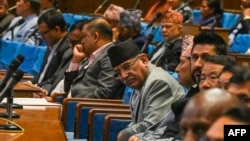Nepal’s prime minister lost a vote of confidence in parliament on Friday after the largest party in his coalition government withdrew its support, which would now force him to step down from office after 19 months in power.
Pushpa Kamal Dahal failed to get the support of more than half the members of the House of Representatives, the lower house of parliament on Friday, needed to win the vote.
Parliament Speaker Dev Raj Ghimire announced that he only received 63 votes in his favor while 194 other members voted against him denying him the majority that was required for him to hold on to power.
He had to move a confidence motion in parliament after his main ally in government, the Communist Party of Nepal (Unified Marxist Leninist) decided to pull out their support last week and join hands with the Nepali Congress — the largest party in the country — to form a new alliance.
The alliance has agreed that Khadga Prasad Oli, the leader of the communist party will be the new prime minister.
Dahal had been leading a shaky governing coalition since becoming prime minister in December 2022 following an inconclusive election where his party finished third. But he formed a new alliance and became its leader and the prime minister.
He had to seek a vote of confidence in parliament five times since he became leader because of disagreements within his coalition partners.
This was his third time as the prime minister of the Himalayan nation since his Maoist group ended an armed revolt and joined mainstream politics in 2006.
Dahal, also known as Prachanda, or the “fierce one,” led a violent Maoist communist insurgency from 1996 to 2006. More than 17,000 people were killed and the status of many others remains unknown.
The Maoists gave up their armed revolt, joined a U.N.-assisted peace process in 2006 and entered mainstream politics. Dahal’s party secured the most parliamentary seats in 2008 and he became prime minister, but quit a year later over differences with the president.




